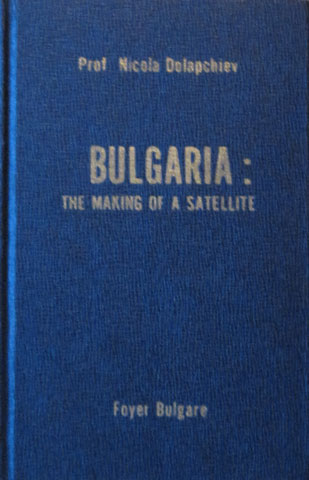
Some years after Bulgaria fell into its Soviet orbit, a group of dissidents living abroad began a free cultural center called “Foyer Bulgare,” whose aim was to preserve the cultural heritage of the nation in the face of Soviet propaganda efforts. In 1969 they introduced a competition to select for publication a work on Bulgarian history following the communist takeover. Professor Nicola Dolapchiev’s Bulgaria, the Making of a Satellite won the competition and was released in 1971.
The book is a historical study of the first ten years under Communist control. It begins with a historical sketch of prior Bulgarian history of just a few short pages, quickly bringing the reader to the brink of the Second World War and Bulgaria’s entry on the side of the German Reich. The next thirty pages give an account of wartime activities, chiefly from the perspective of Bulgaria as a small, powerless country, desperately trying to avoid being trampled by giants wrestling around them. The bulk of the book is then given over to a clinical examination of developments within the country following the coup d’etat on the 9th of September, 1944, divided into topical discussions of politics, the military, law and justice, human rights, economics, culture and religion.
The discussion of political developments is divided into three parts, or stages, which the author names genuine coalition, untrue coalition, and one-party regime. The first stage lasted less than a year, until the multi party coalition disintegrated in August 1945. The second lasted from the postponement of general elections in that same month until 1948 and the adoption of the new constitution for the People’s Republic of Bulgaria. The third stage begins with the Communist consolidation of control and was ongoing as of the time of writing.
Dolapchiev is at his strongest as a chronicler of events, systematically introducing key characters and organizations, sequencing decisions and actions, and weaving together the various strands to show us the whole picture of what actually happened. His knowledge of detail is impressive. Several times while reading I found myself forced to turn back the pages to a prior episode to make sure I followed the characters properly.
The division of chapters by topical concern is a useful tool to drive analysis of the overall situation. In case after case, the author demonstrates how the Communists worked intentionally to infiltrate and undermine existing institutions, replacing them with totalitarian structures designed to further the Soviet cause. By the time he completes his task, the conclusion is obvious. In less than ten years, the Russian controlled government completely recast Bulgarian society as a Soviet state.
One shortcoming of the work is an undercurrent of whining against all of the parties who fought, oppressed or ignored the Bulgarian people throughout history. If Dolapchiev is to be believed, the Bulgarians are a people always set upon from without. They are never really responsible for their own actions. In that respect, an honest discussion of why the Bulgarians repeatedly make bad choices would be perhaps more useful than the incessant cry, “We’re not guilty,” to borrow a popular contemporary phrase.
Nevertheless, Bulgaria, the Making of a Satellite is a valuable record of a tumultuous time in history, and an important read for anyone interested in the dissident response to the Communist regime.
Reviewed by Bob Faber
Bulgaria, the Making of a Satellite: Analysis of the Historical Developments, 1944-1953
By Professor Nicola Dolapchiev
Foyer Bulgare, Bulgarian Historical Institute
Rio de Janeiro, 1971
ISBN not available
Contents
Foreword
Introduction
Bulgaria on the verge of war
Dark clouds
Before the Storm
Dragging into the war
The storm
Bulgaria’s fate pre-decided
The Yalta conference
Soviet troops occupy Bulgaria
Political development since the Soviet occupation of Bulgaria
First stage
Second stage
Third stage
Communization of the Bulgarian army
Law and justice
Violation of human rights
Economic development
Cultural development
Persecution of religion
Conclusion
Bibliographical Entry:
Dolapchiev, Nicola. Bulgaria, the Making of a Satellite: Analysis of the Historical Developments, 1944-1953. Rio de Janeiro: Foyer Bulgare, Bulgarian Historical Institute, 1971.













… [Trackback]
[…] Read More here: bulstack.com/2009/09/22/bulgaria-the-making-of-a-satellite/ […]
[…] people. The presentation is in marked contrast to that described in the dissident authored work Bulgaria: The Making of a Satellite, and a comparison of the two would be intriguing. The rise of communism is portrayed as home-grown, […]